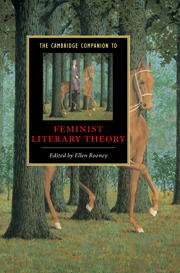Book contents
- Frontmatter
- Introduction
- Part 1 Problematics emerge
- Part 2 In feminism’s wake: genre, period, form
- 4 What feminism did to novel studies
- 5 Autobiography and the feminist subject
- 6 Modernisms and feminisms
- 7 French feminism’s écriture féminine
- 8 Feminism and popular culture
- Part 3 Feminist theories in play
- Index
7 - French feminism’s écriture féminine
from Part 2 - In feminism’s wake: genre, period, form
Published online by Cambridge University Press: 28 November 2006
- Frontmatter
- Introduction
- Part 1 Problematics emerge
- Part 2 In feminism’s wake: genre, period, form
- 4 What feminism did to novel studies
- 5 Autobiography and the feminist subject
- 6 Modernisms and feminisms
- 7 French feminism’s écriture féminine
- 8 Feminism and popular culture
- Part 3 Feminist theories in play
- Index
Summary
What came to be called French feminism in the United States is principally identified with a group of women writers who achieved prominence in France in the 1970s and 1980s. Although they did not think of themselves as a group, these women promoted an exciting, new approach to thinking about women, their bodies, and their desires, which changed both the shape and the locus of feminist thinking within the US academy. Because of French feminism's emphasis on language as both the ultimate tool of women's oppression and a potential means for subverting, if not escaping that oppression, it made literary studies the leading discipline in the growing field of women's studies. Its grounding in contemporary, intellectual thought brought a heady and difficult field of French theory to the foreground of feminist literary thinking, thus directing its focus away from historical and experiential research. What made French feminism so popular, some would say, had to do with the traditional seductiveness of things French and the inferiority complex experienced by US women in relation to the sophisticated style of their continental sisters. Seduction was clearly part of it – these were texts which, for all their intellectualism, talked about desire and the body, about women's erogenous zones and the possibilities of unleashing their libidinal force in writing. For French feminists, women's desire is what is most oppressed and repressed by patriarchy, and what most needs to find expression – an all but impossible task since, according to them, language is itself patriarchal. “Jouissance,” the French word for orgasm or for a pleasure so intense that it is at once of the body and outside it, became a fashionable term of literary theory for an intensity which, like woman's pleasure, is outside language.
- Type
- Chapter
- Information
- The Cambridge Companion to Feminist Literary Theory , pp. 153 - 171Publisher: Cambridge University PressPrint publication year: 2006
- 4
- Cited by

